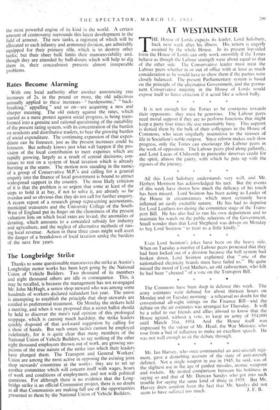AT WESTMINSTER
THE House of Lords expects its leader, Lord Salisbury, back next week after his illness. His return is eagerly awaited by the whole House. In its present lop-sided form the House of Lords can only work smoothly if the Tories behave as though the Labour strength were about equal to that of the other side. The Conservative leader must treat the Labour peers whether in or out of office with at least as much consideration as he would have to show them if the parties were closely balanced. The present Parliamentary system is based on the principle of the alternative Government, and the perma- nent Conservative majority in the House of Lords would expose itself to tierce criticism if it acted like a school bully.
It is not enough for the Tories to be courteous towards their opponents : they must be generous. The Labour peers need moral support if they are to perform functions that might keep a party four times the size reasonably' busy. This support is denied them by the bulk of their colleagues in the House of Commons, who seem singularly insensitive to the stresses of life in Socialism's noble outpost. Since reform makes such slow progress, only the Tories can encdurage the Labour peers in the work of opposition. The Labour peers plod along gallantly, and Lord Lucas of Chilworth in particular deserves credit for the spirit, almost the gaiety, with which he puts up with the rigours of the journey.
All this Lord Salisbury understands very well, and Mr. Herbert Morrison has acknowledged his tact. But the events of this week have shown how much the delicacy of his touch has been missed. Lord Swinton has been acting as Leader of the House in circumstances whic'h must certainly have inflamed an easily excitable nature. He has had to deputise for Lord Leathers too during the committee stage of the Trans- port Bill. He has also had -to run his own department and to maintain his watch on the public relations of the Government. Small wonder then that Lord Shepherd was driven on Monday • to beg Lord Swinton " to treat us a little kindly."
Even Lord Swinton's jokes have been on the heavy side. When on Tuesday a number of Labour peers protested that they had been locked out of a division because the bell system had broken down. Lord Swinton explained that " one of the nationalised electricity boards must have failed us." He quite missed the mood of Lord Mathers, an old railwayman. who felt he had been "cheated "of a vote on the 'Transport Bill.
The Commons have been deep in defence this week. The army estimates were debated for about thirteen hours on Monday and on Tuesday morning--a rehearsal no doubt for the conventional all-night sittings on the Finance Bill—and the debate on the air estimates was arranged for Thursday. It will be a relief to our friends and allies abroad to know that the House agreed, without a vote, to keep an army of 554,000 until March 31st. 1954. And the House itself was impressed by the valour of Mr. Head, the War Minister, who rose from a bed of influenza to make an excellent speech. He was not well enough to sit the debate through.
Mr. Ian Harvey. who once commanded an anti-aircraft regi- ment, gave a disturbing account of the state of anti-aircraft defence. Not a single weapon in use in 1945, he said, was of the slightest use in the age of guided missiles, atomic weapong and rockets. He invited comparison between his boldness in saying so and that of Mr. Duncan Sandys who 'got into such trouble for saying the same kind of thing in 1939. But Mr. Harvey drew comfort from the fact that Mr. Sandys did not.


































 Previous page
Previous page